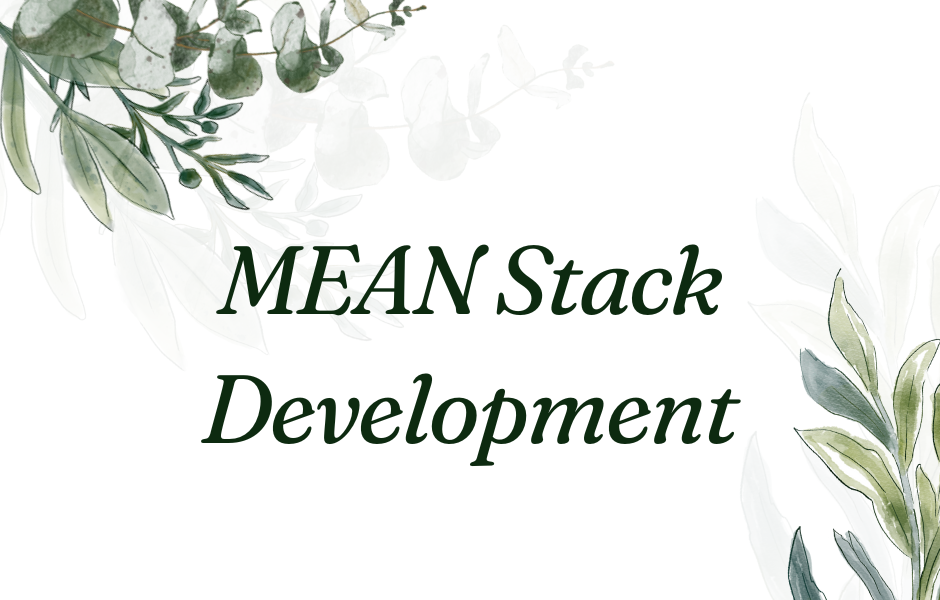Here is the course outline of Accelerated MEAN Stack Development: Building Modern Web Applications.
Embark on a journey into full-stack web development with our project-based short-term course on the MEAN stack. The MEAN stack, consisting of MongoDB, Express.js, Angular, and Node.js, provides a comprehensive and efficient solution for building dynamic web applications. Whether you’re a novice programmer or an experienced developer looking to expand your skill set, this course will equip you with the knowledge and hands-on experience necessary to develop powerful web applications using the MEAN stack.
Course Outline
- Introduction to the MEAN Stack
- Overview of MongoDB, Express.js, Angular, and Node.js
- Understanding the architecture and advantages of the MEAN stack
- Setting up the development environment
- Building a RESTful API with Node.js and Express.js
- Creating routes for CRUD operations
- Integrating MongoDB as the database using Mongoose
- Implementing middleware for authentication and error handling
- Front-end Development with Angular
- Introduction to Angular framework and TypeScript
- Building components, services, and modules in Angular
- Managing data binding and state management
- Integrating the Frontend with the Backend
- Making HTTP requests from Angular to the Express.js backend
- Consuming API endpoints in Angular components
- Handling asynchronous operations with Observables and Promises
- User Authentication and Authorization
- Implementing authentication using JSON Web Tokens (JWT)
- Securing routes and resources based on user roles
- Persisting user sessions and tokens
- Real-time Communication with WebSockets (Optional)
- Introduction to WebSockets and socket.io
- Implementing real-time chat or notifications in the application
- Deployment and Continuous Integration/Continuous Deployment (CI/CD)
- Deploying the application to cloud platforms like Heroku or AWS
- Setting up CI/CD pipelines for automated testing and deployment
- Project Work
- Working on a comprehensive project throughout the course
- Implementing features such as user authentication, CRUD operations, real-time updates, etc.
- Applying best practices for code organization, documentation, and scalability
Duration: 6-8 weeks (depending on intensity and frequency of classes)
Target Audience
- Web developers interested in mastering the MEAN stack for building modern web applications.
- Front-end developers looking to transition into full-stack development.
- Students and professionals seeking practical experience in building real-world projects with cutting-edge web technologies.
Prerequisites
- Basic knowledge of HTML, CSS, and JavaScript.
- Familiarity with any programming language or framework is helpful but not required.
Delivery Method
- Instructor-led lectures and live coding sessions.
- Hands-on workshops and guided project development.
- Code reviews and feedback sessions.
- Access to online resources, documentation, and community support for further learning.
Upon completion of the course, participants will have the skills and confidence to develop full-stack web applications using the MEAN stack, along with a solid understanding of best practices for building scalable, maintainable, and secure applications.
Mail us for queries: emailtoprogrammingempire@gmail.com
Further Reading
Flutter and Dart Essentials: Rapid Mobile App Development
Spring Framework Practice Problems and Their Solutions
From Google to the World: The Story of Go Programming Language
Why Go? Understanding the Advantages of this Emerging Language
Creating and Executing Simple Programs in Go
20+ Interview Questions on Go Programming Language
100+ MCQs On Java Architecture
- Angular
- ASP.NET
- C
- C#
- C++
- CSS
- Dot Net Framework
- HTML
- IoT
- Java
- JavaScript
- Kotlin
- PHP
- Power Bi
- Python
- Scratch 3.0
- TypeScript
- VB.NET

